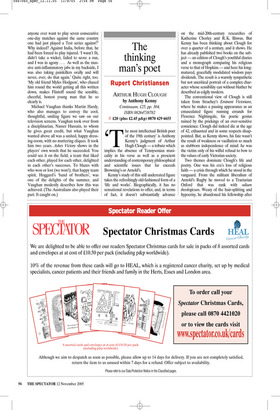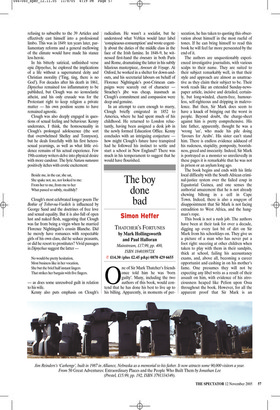The thinking man’s poet
Rupert Christiansen
ARTHUR HUGH CLOUGH by Anthony Kenny Continuum, £25, pp. 304, ISBN 08264738782 ✆ £20 (plus £2.45 p&p) 0870 429 6655 ‘T he most intellectual British poet of the 19th century’ is Anthony Kenny’s judgment of Arthur Hugh Clough — a tribute which implies the absence of Tennysonian musicality in his verse as well as a prescient understanding of contemporary philosophical and scientific issues that far exceeds Browning’s or Arnold’s.
Kenny’s study of this still underrated figure takes the refreshingly old-fashioned form of a ‘life and works’. Biographically, it has no sensational revelations to offer, and, in terms of fact, it doesn’t substantially advance on the mid-20th-century researches of Katherine Chorley and R.K. Biswas. But Kenny has been thinking about Clough for over a quarter of a century, and it shows. He has already published two books on the subject — an edition of Clough’s youthful diaries and a monograph comparing his religious verse to that of Hopkins — and here his longmatured, gracefully modulated wisdom pays dividends. The result is a warmly sympathetic but not uncritical portrait of a complex character whose sensibility can without blather be described as edgily modern.
The conventional view of Clough is still taken from Strachey’s Eminent Victorians, where he makes a passing appearance as an emasculated figure running errands for Florence Nightingale, his poetic genius ruined by the prickings of an over-sensitive conscience. Clough did indeed die at the age of 42, exhausted and in some respects disappointed. But, as Kenny shows, his fate wasn’t the result of weakness or vacillation so much as stubborn independence of mind: he was the victim only of his wilful refusal to bow to the values of early Victorian society.
Two themes dominate Clough’s life and poetry. One was his era’s loss of religious faith — a crisis through which he stood in the vanguard. From the militant liberalism of Arnold’s Rugby he moved to a Tractarian Oxford that was rank with odium theologicum. Weary of the hair-splitting and hypocrisy, he abandoned his fellowship after refusing to subscribe to the 39 Articles and effectively cast himself into a professional limbo. This was in 1849: ten years later, parliamentary reforms and a general mellowing of the climate would have made his stance less heroic.
In his bitterly satirical, unfinished verse epic Dipsychus, he explored the implications of a life without a supernatural deity and Christian morality (‘Ting, ting, there is no God’). For decades after his death in 1861, Dipsychus remained too inflammatory to be published, but Clough was no iconoclastic atheist, and his only crusade was for the Protestant right to keep religion a private matter — his own position seems to have remained agnostic.
Clough was also deeply engaged in questions of sexual feeling and behaviour. Kenny underrates, I think, the homosexuality in Clough’s prolonged adolescence (the sort that overwhelmed Shelley and Tennyson), but he deals forcefully with his first heterosexual yearnings, as well as what little evidence remains of his actual experience. Few 19th-century writers delve into physical desire with more candour. The lyric Natura naturans positively itches with erotic excitement:
Beside me, in the car, she sat, She spake not, no, nor looked to me: From her to me, from me to her What passed so subtly, stealthily?
Clough’s most celebrated longer poem The Bothie of Tober-na-Vuolich is influenced by George Sand and the doctrines of free love and sexual equality. But it is also full of open lust and naked flesh, suggesting that Clough was far from being a virgin when he married Florence Nightingale’s cousin Blanche. Did he merely have romances with respectable girls of his own class, did he seduce peasants, or did he resort to prostitutes? Vivid passages in Dipsychus suggest the latter —
No would-be pretty hesitation, Most business like in her vocation, She but the brief half instant lingers That strikes her bargain with five fingers.
— as does some unresolved guilt in relation to his wife.
Kenny also puts emphasis on Clough’s radicalism. He wasn’t a socialist, but he understood what Veblen would later label ‘conspicuous consumption’ and wrote cogently about the duties of the middle class in the face of the Irish famine. In 1848–9, he witnessed first-hand the émeutes in both Paris and Rome, dramatising the latter in his subtly hilarious masterpiece, Amours de Voyage. At Oxford, he worked in a shelter for down-andouts, and his secretarial labours on behalf of Florence Nightingale’s post-Crimean campaigns were scarcely out of character — Strachey’s jibe was cheap, inasmuch as Clough’s commitment and compassion were deep and genuine.
In an attempt to earn enough to marry, Clough briefly emigrated in 1852 to America, where he had spent much of his childhood. He returned to London reluctantly, having been assigned a desk job in the newly formed Education Office. Kenny concludes with an intriguing conjecture how might Clough’s future have transpired had he followed his instinct to settle and start a school in New England? There was much in his temperament to suggest that he would have flourished.




























































 Previous page
Previous page